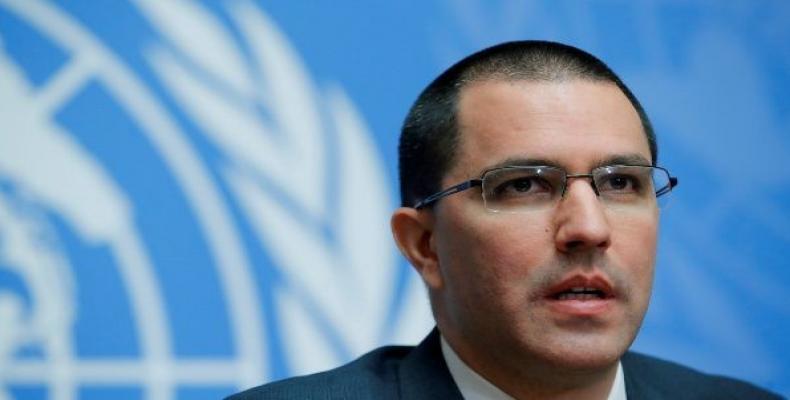Geneva, Feb 28 (RHC)-- Venezuela’s Foreign Minister Jorge Arreaza, speaking at a press conference at the United Nations Human Rights Council session in Geneva, criticized the Spanish government for “fanning the flames” of conflict after opposing the recent peace talks between the government and the opposition.
Arreaza reiterated that Spain's policy should not be ideologized. “Don't’ ideologize Spain’s foreign policy and don’t try to corner us… putting a country at risk of conflict,” Arreaza said directing the complaint at Mariano Rajoy, the president of the Spanish government.
Arreaza also stressed the importance of dialogue. “Dialogue is fundamental and anything other than dialogue puts us in a situation like last year when opposition groups destroyed public and private property, killed people, set people on fire,” Arreaza lamented.
On a question about the upcoming presidential elections and democratic guarantees, Arreaza answered: “In Venezuela, every electoral process is accompanied by international observation. However, in this particular case, the Venezuelan opposition proposed… an international observation with greater media relevance... with renowned people and the decision made… to invite the U.N. General Secretary Antonio Guterres so he can form an international commission.”
Arreaza pointed out that the opposition didn’t sign the agreement reached in the Dominican Republic last month but stressed that the government will fulfill its commitments unilaterally. So far, invitations to accompany the electoral process have been sent to the U.N. Secretary General, UNASUR, the African Union, and the guarantor countries of the dialogues held in the Dominican Republic.
He also referred to the U.S. sanctions and the “economic war” waged against Venezuela. Arreaza explained Venezuela’s inflation process is induced: “The exchange rate in Venezuela is not determined by the Central Bank or a ministry, but rather by a website in Miami… we suspect it must be linked to a security agency in the U.S., where the exchange rate changes… with influence of political factors.”
When a journalist asked Arreaza about the alleged “humanitarian crisis” in Venezuela, he explained that in spite of scarcity in certain foods and medicine, the Venezuelan government has implemented policies to insure Venezuelans get the staples through direct distribution from the state and was adamant that the obstacle to overcome these shortcomings are the sanctions imposed by the United States government of Donald Trump.
Finally, Arreaza warned that framing the economic crisis in Venezuela as a humanitarian crisis only serves to provide an excuse for a military intervention. He recalled a speech by U.S. President Donald Trump where he attempted to justify a possible military operation citing the humanitarian crisis.
Venezuela criticizes Spain for fanning flames of conflict

Related Articles
Commentaries
MAKE A COMMENT
All fields requiredMore Views
- Cuba explores technique to reduce vector population
- UN warns that nearly 55 million face hunger in West and Central Africa
- Artificial intelligence platform is developed in Cuba
- FAO assists Cuba in forest protection
- Extradition of Julian Assange edges closer as U.S. claims it will respect his human rights

